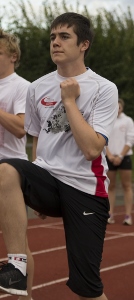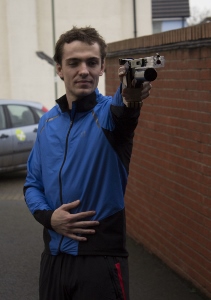Main Menu
Latest Blog Entry
User login
Getting teenagers to take control of their sport preparation
“I don’t have a warm up routine”
 was the quote of the day from a 16 year old experienced competitor on our Athlete Support Day on Monday.
was the quote of the day from a 16 year old experienced competitor on our Athlete Support Day on Monday.
Another young athlete I work with was a bundle of nerves before a recent competition. I am trying hard to get these young people to establish a warm up routine that is regular, specific and gives them confidence.
Too often I see the well prepared athlete unravel as the competition approaches: distracted by the venue, other competitors or their own inner demons.
I got the athletes to divide the warm up into 3 different phases and to come up with exercises that were suitable for each phase:
- “Just out of the car”. They have travelled to the comp for 1-3 hours, or been sat down at school. The body has to just move and get warm. General work
- “Sporting movements”. Build up to run, jump, throw, tackle in different directions. This can be similar to the event, rather than replicate at this stage: long jumpers can do 2 footed jumps for example, rugby players can do some grappling drills, soccer players can practice pass and move.
- “White line fever”. 5 minutes before the event you need to be moving fast and furious, with the warm up looking very similar to what is about to happen. You need to be ready to beat your opponent as soon as you cross the line.
Despite my best efforts, this is still a work in progress. When asked to show me each stage I often see the default “pull arm across the body stretch” or the “jog“.
Regeneration
 Sorry to disappoint Dr Who fans, this is about regenerating the body and mind after exercise and life. We have covered nutrition on other support days, this time we looked at the improtance of getting a good night’s sleep.
Sorry to disappoint Dr Who fans, this is about regenerating the body and mind after exercise and life. We have covered nutrition on other support days, this time we looked at the improtance of getting a good night’s sleep.
We discussed sleep routines and reasons why sleep may be disturbed. We then did a Progressive Muscular Relaxation (PMR) session (which had a delayed start due to a fit of giggles from the team, laughter being an important part of regeneration).
PMR is a useful tool to have as an athlete. It helps toward getting sound sleep, and it is also useful in sport itself if practiced regularly.
Eventually it becomes possible to shorten the relaxation time to a few seconds. This can then be used to calm nerves pre match, or in the match in itself for things like free kicks, free throws and pistol shooting.
Strong and agile
I introduced the athletes to the “Squat matrix” followed by either a dumbbell complex or snatch variations. Teenagers seem to be caught between “no weights” or “beach weights” with “adult weights” being imposed upon rugby players somehere in between.
The squat matrix is designed to develop leg strength through multiple planes, angles and speed whilst challenging balance and coordination. It is somethingI learnt from Kelvin Giles who reminded me recently that it is all too easy to do body weight squats for a few weeks then “load ’em up” with a barbell.
Young athletes need to fully develop their spectrum of movement abilities as this helps their overall athleticism. It is easy for teachers and coaches to regress to “what teenage boys want” or “what the senior players are doing“.
I finished the day with a series of agility exercises, moving over and under things, from two foot to single foot and challenging coordination again. This is something I have been working on the last 4 weeks with the senior footballers I coach.
It does require the athlete to be strong and agile, but they are seeing the beenfits on the field: where it matters.
Thanks again to Exeter University for hosting and for the parents for supporting their children.
Please contact me if you wish to attend our next workhop.
Further reading
Client Testimonials
 Bath University
Bath University
"James worked with the Exeter and Taunton based Southwest Talent Centre scholarship athletes. He is deeply knowledgeable about strength and conditioning and has excelled at working with young athletes. His sessions are challenging and fun and he has succeeded in blending a group of athletes from a diverse range of sports into a cohesive training group.
More


Comments
[…] Getting teenagers to take charge of their sporting preparation […]